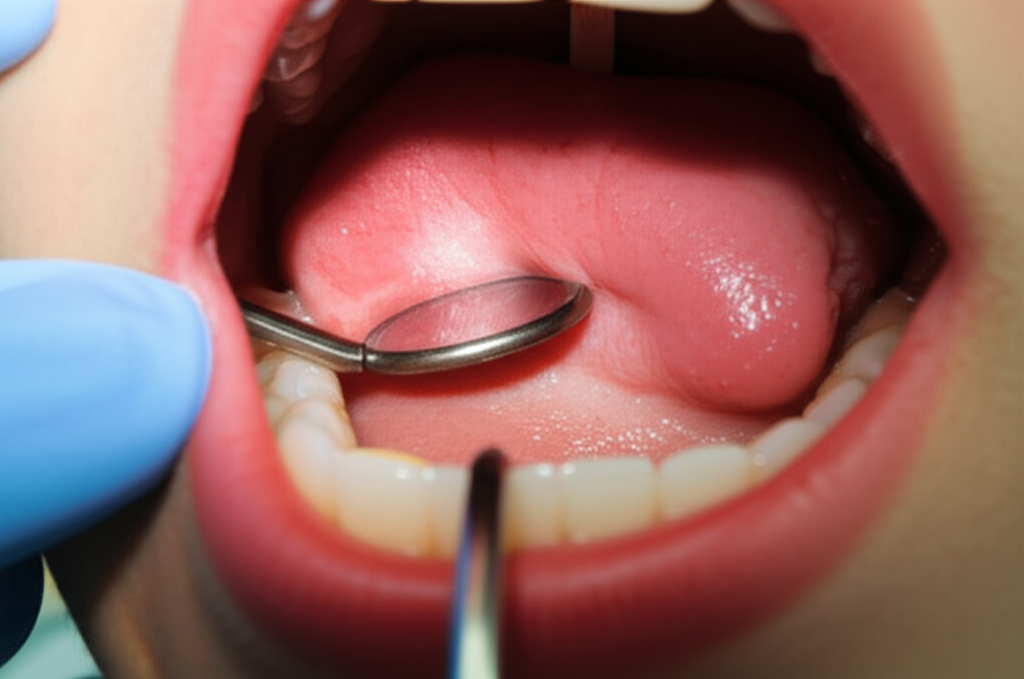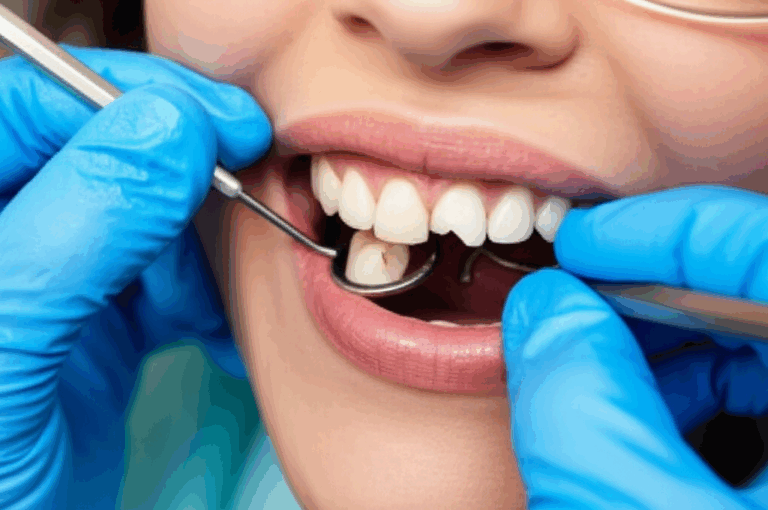
Can a Dentist Remove Tonsil Stones? Understanding Your Treatment Options
If you ever saw small, bad-smelling pieces in your throat or had strange bad breath, you might have tonsil stones. This article will show you how dentists can help with tonsil stones, what else you can do, and why keeping your mouth clean matters. I’ll explain the steps simply, help you spot the signs, and show you how to feel better—all in plain English.
Table of Contents
What Are Tonsil Stones?
Let’s start simple. Tonsil stones, or tonsilloliths, are tiny lumps that form in your tonsils—the soft tissues at the back of your throat. They’re usually white or yellow and can smell pretty bad. These stones aren’t just food. Instead, they build up from calcium, germs, spit, and pieces of food that get stuck in small holes (called crypts) in your tonsils.
Usual Symptoms and Causes
- Bad breath
- Feeling like there’s something in your throat
- Sore throat
- White or yellow lumps you might see at the back of your throat
- Sometimes ear pain (even if your ears are fine)
Tonsil stones are more common than you think, especially if you have had a lot of sore throats or your tonsils have deep holes. Many people feel weird about them, but it’s really nothing strange—anyone can get them.
Can a Dentist Clean Out Tonsil Stones?
Here’s what many ask: Can a dentist help with tonsil stones?
Short answer: Yes, but only sometimes.
A dentist might spot tonsil stones during a checkup. If the stones are small and easy to reach, a dentist might take them out gently. Dentists know a lot about taking care of your mouth, teeth, and gums—and that includes the part of your throat you can see.
Why People Ask Dentists First
You probably visit your dentist more often than a regular doctor. Since tonsil stones are right in your mouth, it makes sense to ask your dentist. Dentists look after your mouth care and often notice stuff you might miss.
But dentists can’t do everything. If the stones are deep, very big, or if they keep coming back, you need to see another expert.
How Do Dentists Spot Tonsil Stones?
Dentists use their eyes and their tools. In a normal dental exam, your dentist might:
- Look closely at your tonsils for any white spots or small lumps.
- Use a small mirror or even an X-ray if something looks odd.
- Notice things like bad breath that could mean tonsil stones are hiding there.
If you’re wondering “Do dentists check for tonsil stones?”—they do, especially if you mention any signs! Some dental clinics, including china dental lab, have good experience with these mouth checks and know what to look for.
Dentists can also tell if it’s something else. Sometimes a tonsil stone might really be another problem, like an infection or bit of food stuck in your throat.
When Dentists Can—and Can’t—Remove Tonsil Stones
When Dentists Can Help
- Small, easy-to-see stones: If a stone is near the surface, your dentist might use a little tool or a water flosser to take it out.
- Advice on keeping your mouth clean: Dentists are good at showing you how to keep your mouth extra clean so you don’t get more stones.
When Dentists Can’t Help
But deep stones or big tonsil stones are another story. Dentists can only work with what’s easy to get to. If a stone is behind or inside your tonsil, your dentist will usually send you to a specialist called an ENT (Ear, Nose, and Throat doctor).
Don’t try to poke out deep stones yourself—you might get an infection or make it bleed. Sometimes dentists might wash your mouth out or tell you to use salt water, but tough or hidden stones need a specialist.
Who Else Removes Tonsil Stones? Meet The Specialists
If your tonsil stones are hard to get rid of, come back over and over, or hurt a lot, you need a real expert.
ENT Specialist (Ear, Nose, and Throat Doctor)
An ENT doctor is the main expert for tonsil stones. They can look far into your throat, use special tools, and try treatments a dentist can’t.
- Office treatments: ENTs can use little tools to get out stones that are deeper or bigger.
- Laser or radio waves: Some new ways can smooth out the tonsil holes so stones don’t come back as much.
Oral Surgeon
For very bad cases, like a huge stone or an abscess (a lump filled with pus), the ENT might ask an oral surgeon to help. If nothing else works, sometimes they talk about taking out your tonsils (called tonsillectomy).
Family Doctor
Your family doctor can help, too. They might confirm it’s a tonsil stone or send you to a specialist if needed.
How Are Tonsil Stones Treated by Professionals?
Here are the main ways doctors might treat tonsil stones.
1. Manual Removal
- ENTs use simple tools like picks, swabs, or suction.
- This is best for stones near the surface or not too big.
- It might feel weird or tickly, but it’s quick.
2. Washing Out
- Sometimes dentists or doctors tell you to use a water flosser to push stones out.
- Strong salt water rinses can help too, for stones not stuck too deep.
3. Antibiotics
- Antibiotics won’t get rid of the stones.
- If your tonsils are infected, your doctor might give them to make you better.
4. Laser or Radio Treatment
- These newer ways use heat or special waves to make the tonsil holes smaller, so stones don’t form as much.
- Most people heal fast and get fewer stones after.
5. Tonsil Surgery (Tonsillectomy)
- If you always get bad, big, or painful stones, taking out your tonsils is the last choice.
- Surgery takes some time to heal from, but you won’t have to worry about stones again.
Tip: If you want to know about new dental care, some places like digital dental lab have new tools and scanners to spot or help with these kinds of mouth problems.
When Should You Worry About Tonsil Stones?
Not every tonsil stone means you need a doctor. But sometimes, it’s a good idea to get help.
See your dentist or doctor if:
- You have bad breath that won’t go away (even after you brush, floss, and use mouthwash).
- Your throat is always sore, or you keep feeling something stuck there.
- It’s hard to swallow or your ear hurts a lot.
- Stones keep coming back, you get a fever, or your throat swells up (this could mean infection).
Usually, tonsil stones don’t cause much trouble, but sometimes they cause infections or block your breathing—this is rare.
Can You Prevent Tonsil Stones?
Yes. It’s not always possible, but good mouth cleaning helps lower your chance.
How to Help Stop Tonsil Stones
- Brush and floss every day: At least two times a day. Brush your tongue, too!
- Gargle often: Use salt water or soft mouthwash after eating.
- Drink plenty of water: This keeps your mouth wet and less likely to trap stuff.
- Rinse after eating: Especially after sticky foods like crackers, cheese, or nuts.
It also helps to get regular dental check-ups. Your dentist can give you advice, spot early signs, and keep your mouth healthy. You can also check out what’s safe and good for your mouth at labs that deal with dental ceramics.
Short Patient Story: Living With Tonsil Stones
Here’s a story about “Jake,” which shows how things can go:
Jake, age 38, brushed and flossed every day. But for over a year, he had really bad breath and a strange feeling at the back of his throat. His girlfriend finally told him to ask his dentist, who found small, yellow stones during a checkup. The ones that were easy to see got taken out then, but Jake was sent to an ENT for a better look.
The ENT found bigger stones deeper in his tonsils. They used a gentle laser, which just took a few minutes. Three months later, Jake’s breath was much better. Any tiny stones that showed up now he could just gargle out. Jake felt a lot more sure of himself, and he was happy to talk without worrying about his breath.
FAQs: Your Top Tonsil Stone Questions Answered
Q: Will tonsil stones go away by themselves?
A: Sometimes, yes. Small stones might fall out when you cough or eat crunchy foods. Bigger ones might need help.
Q: Does taking out tonsil stones hurt?
A: Most times, it just feels tickly or a little weird. If you need surgery or laser, they might use numbing medicine.
Q: Can I take out tonsil stones at home?
A: Some people use a swab or water flosser for small stones, but if you poke too hard you could bleed or get an infection. It’s safest to get help for deep or painful stones.
Q: Why do I keep getting tonsil stones?
A: They come back if your tonsil holes are deep or if you often get sore throats. Cleaning your mouth well and maybe getting a special treatment can help.
Key Points and Takeaways
- Tonsil stones are pretty common and usually cause bad breath or bother your throat, but you don’t have to feel awkward about them.
- Dentists can find and sometimes remove small, easy tonsil stones, but tougher ones need a specialist.
- ENT doctors are the main experts for deep, repeated, or very painful tonsil stones.
- Laser treatments and taking out your tonsils are options for the worst cases, but cleaning your mouth well stops most stones.
- Don’t ignore ongoing signs like bad breath or a sore throat—see your dentist or doctor to make sure everything’s okay.
- Regular checkups, brushing, flossing, and gargling are the best way to stop tonsil stones from starting.
- Use trusted dental sources and up-to-date labs for the best info on mouth health.
Look after your mouth, and you can skip a lot of stress. Good mouth cleaning doesn’t just keep out tonsil stones, it makes your smile brighter and makes you feel better every day!
References:








